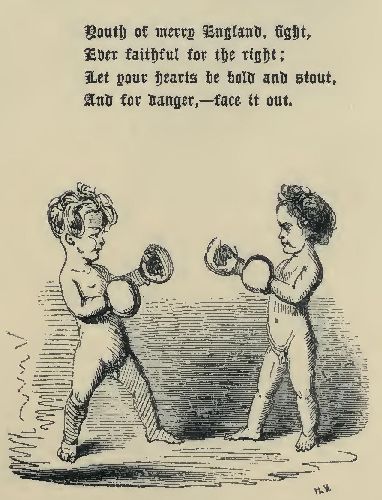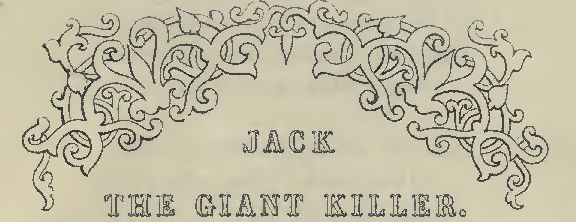

CONTENTS
JACK'S BIRTH, PARENTAGE, EDUCATION, AND EARLY PURSUITS.
HOW JACK SLEW THE GIANT CORMORAN.—-
JACK SURPRISED ONCE IN THE WAY
JACK SCRAPES AND ACQUAINTANCE WITH THE PRINCE OF WALES
JACK SETTLES THE REMAINING GIANTS AND SETTLES DOWN
I sing the deeds of famous Jack,
The doughty Giant Killer hight;
How he did various monsters "whack,"
And so became a gallant knight.
In Arthur's days of splendid fun
(His Queen was Guenever the Pliant),—
Ere Britain's sorrows had begun;
When every cave contained its giant;
When griffins fierce as bats were rife;
And till a knight had slain his dragon,
At trifling risk of limbs and life,
He did n't think he'd much to brag on;
When wizards o'er the welkin flew;
Ere science had devised balloon;
And 'twas a common thing to view
A fairy ballet by the moon;—
Our hero played his valiant pranks;
Earned loads of kudos, vulgô glory,
A lady, "tin," and lots of thanks;—
Relate, oh Muse! his wondrous story.
A Giant was, I should premise,
A hulking lout of monstrous size;
He mostly stood—I know you 'll laugh—
About as high as a giraffe.
His waist was some three yards in girth:
When he walked he shook the earth.
His eyes were of the class called "goggle,"
Fitter for the scowl than ogle.
His mouth, decidedly carnivorous,
Like a shark's,—the Saints deliver us!
He yawned like a huge sarcophagus,
For he was an Anthropophagus,
And his tusks were huge and craggy;
His hair, and his brows, and his beard, were shaggy.
I ween on the whole he was aught but a Cupid,
And exceedingly fierce, and remarkably stupid;
His brain partaking strongly of lead,
How well soe'er he was off for head;
Having frequently one or two
Crania more than I or you.
He was bare of arm and leg,
But buskins had, and a philabeg;
Also a body-coat of mail
That shone with steel or brazen scale,
Like to the back of a crocodile's tail;
A crown he wore,
And a mace he bore
That was knobbed and spiked with adamant;
It would smash the skull
Of the mountain bull,
Or scatter the brains of the elephant.
His voice than the tempest was louder and gruffer—
Well; so much for the uncouth "buffer."
Of a right noble race was Jack,
For kith and kin he did not lack,
Whom tuneful bards have puffed;
The Seven bold Champions ranked among
That highly celebrated throng,
And Riquet with the Tuft.
Jack of the Beanstalk, too, was one;
And Beauty's Beast; and Valour's son,
Sir Amadis de Gaul:
But if I had a thousand tongues,
A throat of brass, and iron lungs,
I could not sing them all.
His sire was a farmer hearty and free;
He dwelt where the Land's End frowns on the sea,
And the sea at the Land's End roars again,
Tit for tat, land and main.
He was a worthy wight, and so
He brought up his son in the way he should go;
He sought not—not he!—to make him a "muff;"
He never taught him a parcel of stuff;
He bothered him not with trees and plants,
Nor told him to study the manners of ants.
He himself had never been
Bored with the Saturday Magazine;
The world might be flat, or round, or square,
He knew not, and he did not care;
Nor wished that a boy of his should be
A Cornish "Infant Prodigy."
But he stored his mind with learning stable,
The deeds of the Knights of the famed Round Table;
Legends and stories, chants and lays,
Of witches and warlocks, goblins and fays;
How champions of might
Defended the right,
Freed the captive, and succoured the damsel distrest
Till Jack would exclaim—
"If I don't do the same,
An' I live to become a man,—I'm blest!"
Jack lightly recked of sport or play
Wherein young gentlemen delight,
But he would wrestle any day,
Box, or at backsword fight.
He was a lad of special "pluck,"
And strength beyond his years,
Or science, gave him aye the luck
To drub his young compeers.
His task assigned, like Giles or Hodge,
The woolly flocks to tend,
His wits to warlike fray or "dodge"
Wool-gathering oft would wend.
And then he'd wink his sparkling eye,
And nod his head right knowingly,
And sometimes "Won't I just!" would cry,
Or "At him, Bill, again!"
Now this behaviour did evince
A longing for a foe to mince;
An instinct fitter for a Prince
Than for a shepherd swain.
I.
Where good Saint Michael's craggy mount
Rose Venus-like from out the sea,
A giant dwelt; a mighty- Count
In his own view, forsooth, was he;
And not unlike one, verily,
(A foreign Count, like those we meet
In Leicester Square, or Regent Street),
I mean with respect to his style of hair,
Mustachios, and beard, and ferocious air,—
His figure was quite another affair.
This odd-looking "bird"
Was a Richard the Third,
Four times taller and five as wide;
Or a clumsy Punch,
With his cudgel and hunch,
Into a monster magnified!
In quest of prey across the sea
He'd wade, with ponderous club;
For not the slightest "bones" made he
Of "boning" people's "grub."
There was screaming and crying "Oh dear!" and "Oh law
When the terrified maids the monster saw;
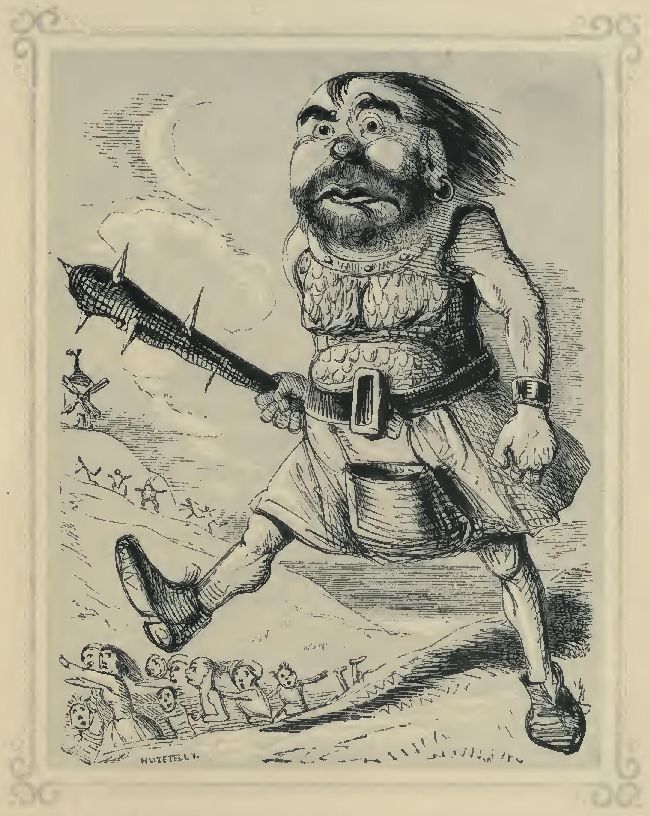
As he stalked—tramp! tramp!
Stamp! stamp! stamp! stamp!
Coming on like the statue in "Don Giovanni."
"Oh my!" they would cry,
"Here he comes; let us fly!
Did you ever behold such a horrid old brawny? —
A—h!" and off they would run
Like "blazes," or "fun,"
Followed, pell-mell, by man and master;
While the grisly old fellow
Would after them bellow,
To make them scamper away the faster.
II.
When this mountain bugaboo
Had filled his belly, what would he do?
He'd shoulder his club with an ox or two,
Stick pigs and sheep in his belt a few,—
There were two or three in it, and two or three under
(I hope ye have all the "organ of wonder");
Then back again to his mountain cave
He would stump o'er the dry land and stride through the wave.
III.
What was to be done?
For this was no fun;
And it must be clear to every one,
The new Tariff itself would assuredly not
Have supplied much longer the monstrous pot
Of this beef-eating, bull-headed, "son-of-a-gun."
IV.
Upon a night as dark as pitch
A light was dancing on the sea;—
Marked it the track of the Water Witch?
Could it a Jack-a-lantern be?
A lantern it was, and borne by Jack;
A spade and a pickaxe he had at his back;
In his belt a good cow-horn;
He was up to some game you may safely be sworn.
Saint Michael's Mount he quickly gained,
And there the livelong night remained.
What he did
The darkness hid;
Nor needeth it that I should say:
Nor would you have seen,
If there you had been
Looking on at the break of day.
V.
Morning dawned on the ocean blue;
Shrieked the gull and the wild sea-mew;
The donkey brayed, and the grey cock crew;
Jack put to his mouth his good cow-horn,
And a blast therewith did blow.
The Giant heard the note of scorn,
And woke and cried "Hallo!"
He popped out his head with his night-cap on,
To look who his friend might be,
And eke his spectacles did don,
That he mote the better see.
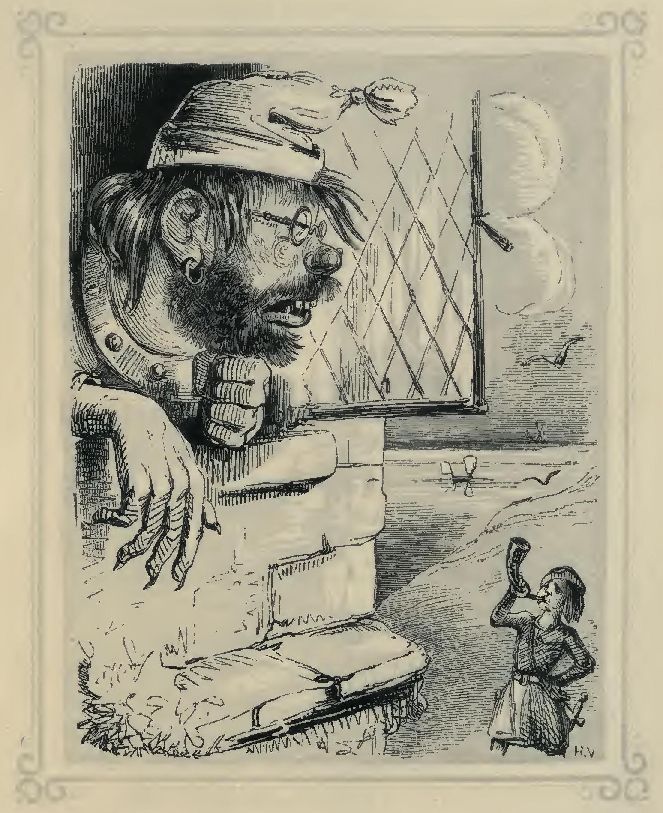
"I'll broil thee for breakfast," he roared amain,
"For breaking my repose."
"Yaa!" valiant Jack returned again,
With his fingers at his nose.
VI.
Forward the monster tramps apace,
Like to an elephant running a race;
Like a walking-stick he handles his mace.
Away, too venturous wight, decamp!
In two more strides your skull he smashes;—
One! Gracious goodness! what a stamp!
Two! Ha! the plain beneath him crashes:
Down he goes, full fathoms three.
"How feel ye now," cried Jack, "old chap?
It is plain, I wot, to see
You 're by no means up to trap."
The Giant answered with such a roar,
It was like the Atlantic at war with its shore;
A thousand times worse than the hullaballoo
Of carnivora, fed,
Ere going to bed,
At the Regent's Park, or the Surrey "Zoo."
"So ho! Sir Giant," said Jack, with a bow,
"Of breakfast art thou fain?
For a tit-bit wilt thou broil me now,
An' I let thee out again? "
Gnashing his teeth, and rolling his eyes,
The furious lubber strives to rise.
"Don't you wish you may get it?" our hero cries
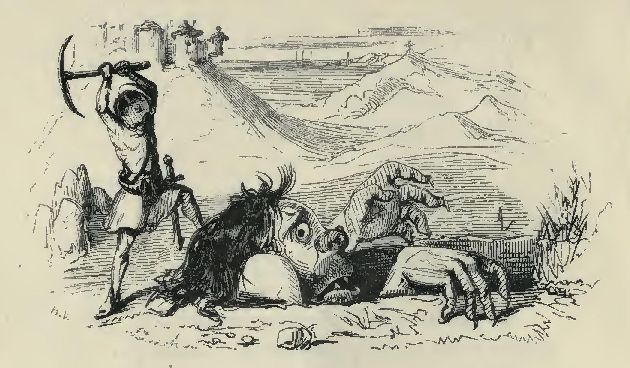
And he drives the pickaxe into his skull:
Giving him thus a belly-full,
If the expression is n't a bull.
VII.
Old Cormoran dead,
Jack cut off his head,
And hired a boat to transport it home.
On the "bumps" of the brute,
At the Institute,
A lecture was read by a Mr. Combe.
Their Worships, the Justices of the Peace,
Called the death of the monster a "happy release:"
Sent for the champion who had drubbed him,
And "Jack the Giant Killer" dubbed him;
And they gave him a sword, and a baldric, whereon
For all who could read them, these versicles shone:—
'THIS IS YE VALYANT CORNISHE MAN
WHO SLEWE YE GIANT CORMORAN"
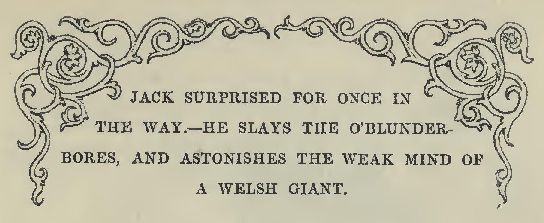
I.
Now, as Jack was a lion, and hero of rhymes,
His exploit very soon made a noise in the "Times;"
All over the west
He was fêted, caressed,
And to dinners and soirees eternally pressed:
Though't is true Giants did n't move much in society,
And at "twigging" were slow,
Yet they could n't but know
Of a thing that was matter of such notoriety.
Your Giants were famous for esprit de corps;
And a huge one, whose name was O'Blunderbore,
From the Emerald Isle, who had waded o'er,
Revenge, "by the pow'rs!" on our hero swore.
II.
Sound beneath a forest oak
Was a beardless warrior dozing,
By a babbling rill, that woke
Echo—not the youth reposing.
What a chance for lady loves
Now to win a "pair of gloves!"
III.
"Wake, champion, wake, be off, be off;
Heard'st thou not that earthquake cough!
That floundering splash,
That thundering crash?
Awake!—oh, no,
It is no go!"
So sang a little woodland fairy;
'T was O'Blunderbore coming
And the blackguard was humming
The tune of "Paddy Carey."
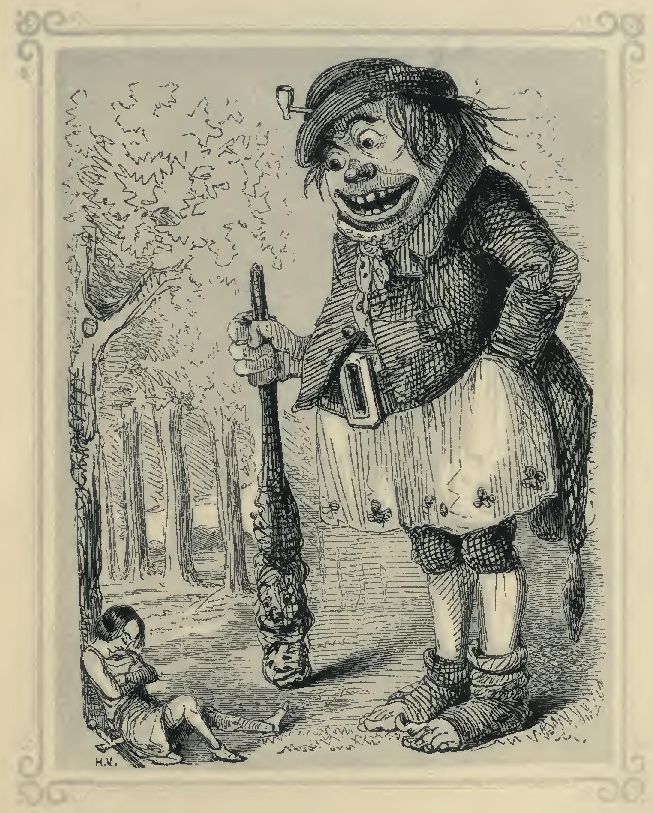
IV.
Beholding the sleeper,
He open'd each peeper
To about the size of the crown of your hat;
"Oh, oh!" says he,
"Is it clear I see
Hallo! ye young spalpeen, come out o' that."
So he took him up
As ye mote a pup,
Or an impudent varlet about to "pop" him:
"Wake up, ye young baste;
What's this round your waist?
Och! murder! "—I wonder he did n't drop him.
He might, to be sure, have exclaimed "Oh, Law!"
But then he preferred his own patois;
And "Murder!" though coarse, was expressive, no doubt,
Inasmuch as the murder was certainly out.
He had pounced upon Jack,
In his cosy bivouack,
And so he made off with him over his back.
V.
Still was Jack in slumber sunk;
Was he Mesmerised or drunk?
I know not in sooth, but he did not awake
Till, borne through a coppice of briar and brake,
He was roused by the brambles that tore his skin,
Then he woke up and found what a mess he was in
He spoke not a word that his fear might shew,
But said to himself—"What a precious go!"
VI.
Whither was the hero bound,
Napping by the Ogre caught?
Unto Cambrian Taffy's ground
Where adventures fresh he sought.
VII.
They gained the Giant's castle hall,
Which seemed a sort of Guy's museum;
With skulls and bones 'twas crowded all—
You would have blessed yourself to see 'em.
The larder was stored with human hearts,
Quarters, and limbs, and other parts,—
A grisly sight to see;
There Jack the cannibal monster led,
"I lave you there, my lad," he said,
"To larn anatomy!—
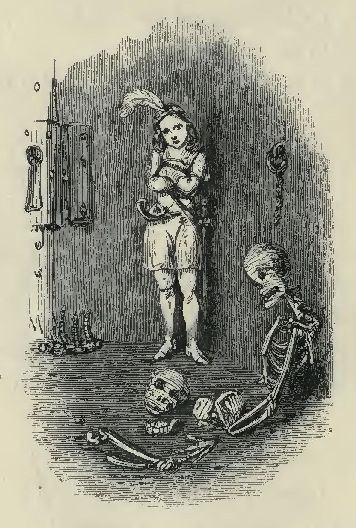
I'm partial to this kind of mate,
And hearts with salt and spice to ate
Is just what plases me;
I mane to night on yours to sup,
Stay here until you 're aten up
He spoke, and turned the key.
"A pretty business this!" quoth Jack,
When he was left alone;
"Old Paddy Whack,
I say! come back—
I wonder where he's gone?"
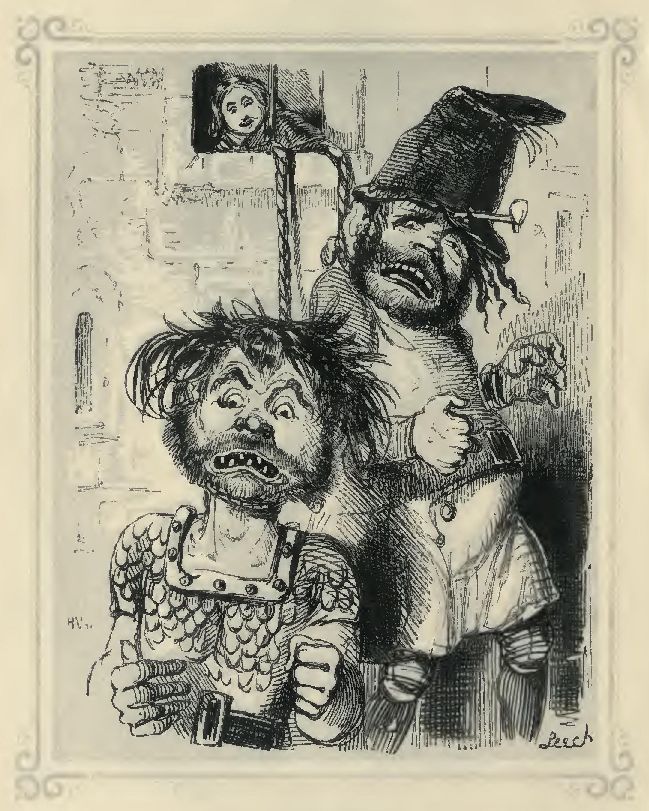
In ghastly moans and sounds of wail,
The castle's cells replied;
Jack, whose high spirits ne'er could quail,
Whistled like blackbird in the vale,
And, "Bravo, Weber!" cried.
When, lo! a dismal voice, in verse,
This pleasant warning did rehearse:—
See Page image: ==>
IX.
"Haste!" quoth the hero, "yes, but how?
They come, the brutes!—I hear them now.'
He flew to the window with mickle speed,
There was the pretty pair indeed,
Arm-in-arm in the court below,
O'Blunderbore and his brother O.
"Now then," thought Jack, "I plainly see
I 'm booked for death or liberty;—
Hallo! those cords are 'the jockeys for me.'
X.
Jack was nimble of finger and thumb—
The cords in a moment have halters become
Deft at noosing the speckled trout,
So hath he caught each ill-favoured lout:
He hath tethered the ropes to a rafter tight,
And he tugs and he pulls with all his might,
"Pully-oi! Pully-oi!" till each Yahoo
In the face is black and blue;
Till each Paddy Whack
Is blue and black;
"Now, I think you're done brown," said courageous Jack.
Down the tight rope he slides,
And his good sword hides
In the hearts of the monsters up to the hilt;
So he settled them each:
O'Blunderbore's speech,
Ere he gave up the ghost was, "Och, murder, I'm kilt!"
XI.
The dungeons are burst and the captives freed;
Three princesses were among them found—
Very beautiful indeed;
Their lily white hands were behind them bound:
They were dangling in the air,
Strung up to a hook by their dear "back hair."
Their stomachs too weak
On bubble and squeak,
From their slaughtered lords prepared, to dine
(A delicate rarity);
With horrid barbarity,
The Giants had hung them up there to pine.
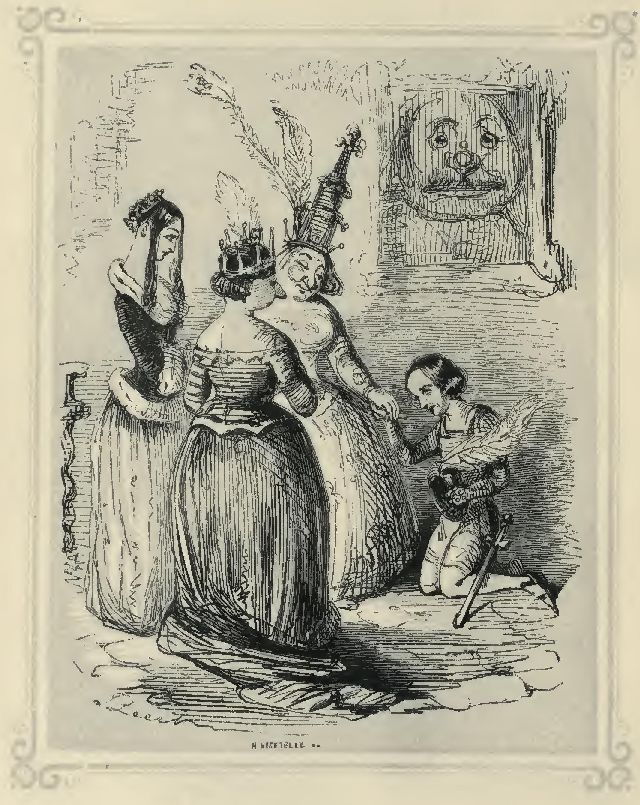
XII.
Jack, the monsters having "licked,"
Had, of course, their pockets picked,
And their keys and eke their riches
Had abstracted from their breeches.
"Ladies," he said, with a Chesterfield's ease,
Permit me, I pray you, to present you with these,"
And he placed in their hands the coin and the keys:
"So long having swung,
By your poor tresses hung,
Sure your nerves are unhinged though yourselves are unstrung;
To make you amends,
Take these few odds and ends,
This nice little castle, I mean, and its wealth;
And I 've only to say,
That I hope that you may
For the future enjoy the most excellent health."
Said the ladies—"Oh, thank you!—expressions we lack "—
"Don't mention it pray," said the complaisant Jack.
XIII.
Jack knelt and kissed the snow-white hands
Of the lovely ladies three;
Oh! who these matters that understands
But thinks, "would that I'd been he! "
Then he bids them adieu; "Au revoir," they cry.
"Take care of yourselves," he exclaims, "good bye!"
XIV.
Away, like Bonaparte in chase,
O'er mount and moor goes Jack;
With his trusty sword before his face,
And its scabbard behind his back.
Away he goes,
And follows his nose;
No wonder, then, that at close of day,
He found himself out
In his whereabout;—
"Dash my buttons," he cried, "I have lost my way
Before him stretched a lonely vale—
Just the place for robbing the mail
Ere that conveyance went by "rail"—
On either side a mount of granite
Outfaced indignant star and planet;
Its thunder-braving head and shoulders,
And threatening crags, and monstrous boulders,
Ten times as high as the cliffs at Brighton,
Uprearing like a "bumptious" Titan,
Very imposing to beholders.
Now the red sun went darkly down,
More gloomy grew the mountains' frown,
And all around waxed deeper brown,—
Jack's visage deeper blue;
Said he, "I guess I'm in a fix,"—
Using a phrase of Mr. Slick's,—
"What on earth shall I do?"
He wandered about till late at night,
At last he made for a distant light;
"Here's a gentleman's mansion," thought Jack, "all right."
He knocked at the wicket,
Crying, "That's the ticket!"
When lo! the portal open flew,
And a monster came out,
Enormously stout
And of stature tremendous, with heads for two.
Jack was rather alarmed,
But the Giant was charmed,
He declared with both tongues, the young hero to see:
"What a double-tongued speech!
But you wo n't overreach
Me" thought Jack; as the Giant said—"Walk in, to tea."
But he saw that to fly
Would be quite "all his eye,"
He could n't, and so it was useless to try;
So he bowed, and complied with the monster's "walk in!"
With a sort of a kind of hysterical grin.
Now this Giant, you know, was a Welshman, and so,
'T was by stealth he indulged in each mischievous "lark
His name was Ap Morgan,
He had a large organ
Of "secretiveness," wherefore he killed in the dark.
"He was sorry that Jack was benighted," he said,
"Might he fenture to peg he'd accept of a ped?"
And he then led the way,
All smiling and gay,
To the couch where his guest might rest his head;
And he bade him good night, politely quite,
Jack answered—"I wish you a very good night."
XV.
Though his eyes were heavy, and legs did ache,
Jack was far too wide awake
To trust himself to the arms of sleep;—
I mean to say he was much too deep.
Stumping, through the midnight gloom,
Up and down in the neighbouring room,
Like a pavior's rammer, Ap Morgan goes.
"I shouldn't much like him to tread on my toes!"
Thought Jack as he listened with mind perplexed;—
"I wonder what he's up to next?"
XVI.
Short was our hero's marvelling;
For, deeming him in slumber locked,
The monstrous oaf began to sing:
Gracious, how the timbers rocked!
From double throat
He poured each note,
So his voice was a species of double bass,
Slightly hoarse,
Rather coarse,
And decidedly wanting a little in grace:
A circumstance which unluckily smashes
A comparison I was about to make
Between it and the great Lablache's,—
Just for an allusion's sake.
Thus warbled the gigantic host,
To the well-known air of "Giles Scroggins' Ghost:
See Page Image: ==>
XVII.
"Ha! say you so,"
Thought Jack; "oh, oh! "
And, getting out of bed,
He found a log;—
"Whack that, old Gog!
He whispered, "in my stead."
XVIII.
In steals the Giant, crafty old fox!
His buskins he'd doffed, and he walked in his socks,
And he fetches the bed some tremendous knocks
With his great big mace,
I' th' identical place
Where Jack's wooden substitute quietly lay;
And, chuckling as he went away,
He said to himself, "How. Griffith Ap Jones
Will laugh when he hears that I've broken his bones!
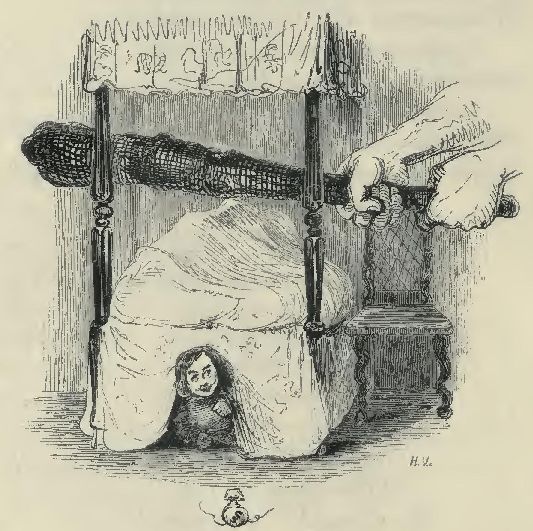
XIX.
The morning shone brightly, all nature was gay;
And the Giant at breakfast was pegging away:
On pantomime rolls all so fiercely fed he,
And he ate hasty-pudding along with his tea.
Oh, why starts the monster in terror and fright?
Why gapes and why stares he when Jack meets his sight?
Why mutters he wildly, o'ercome with dismay,
"How long have ghosts taken to walking by day?"
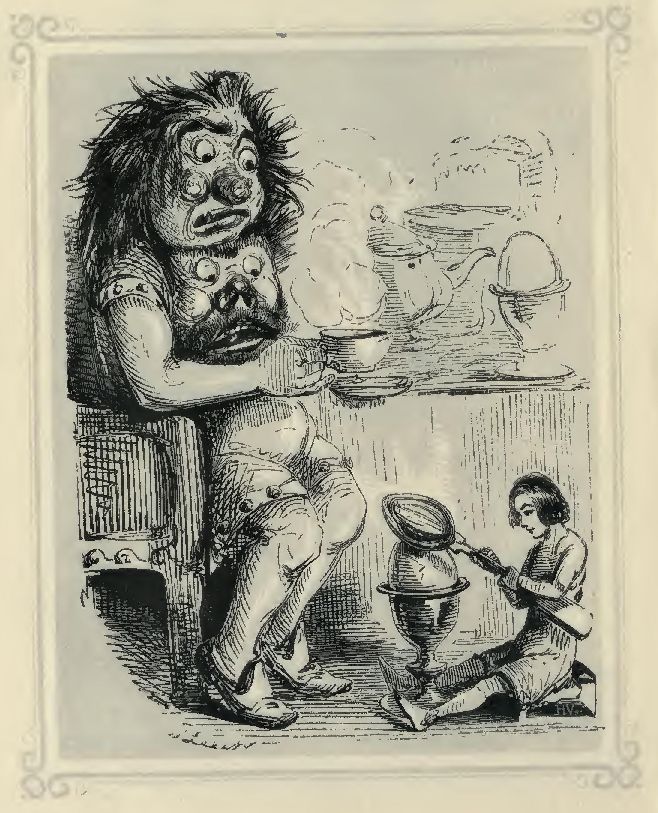
XX.
"Pless us!" he cried, "it can't be;—no! "
"'Tis I," said Jack, "old fellow, though."
"How slept you?" asked the monster gruff.
"Toi lol," he answered;—"well enough:
About twelve, or one, I awoke with a rat,—
At least, I fancied it was that,—
Which fetched me with its tail a ' whop; '
But I went off again as sound as a top."
XXI.
Jack's feet the Giant did n't scan,
Because he was a Pagan man;
And knew no more than a mining lad
What kind of a foot Apollyon had;
But he thought to himself, with a puzzled brow,
"Well, you're a rum one, any how."
Jack took a chair, and set to work,—
Oh! but he ate like a famished Turk;
In sooth it was astounding quite,
How he put the pudding out of sight.
Thought the Giant, "What an appetite!"
He had buttoned his coat together
O'er a capacious bag of leather,
And all the pudding he could n't swallow
He craftily slipped into its hollow.
XXII.
When breakfast was finished, he said, "Old brick,
See here; I 'll show you a crafty trick;
You dare not try it for your life:"
And he ripped up the bag with a table-knife.
Squash! tumbled the smoking mess on the floor,
But Jack was no worse than he was before.
"Odds splutter hur nails!" swore the monster Welch,
And he gashed his belly with fearful squelch;
Let the daylight in
Through the hole in his skin,—
The daylight in and the pudding out,
With twenty gallons of blood about;
And his soul with a terrific "Oh!"
Indignant sought the shades below.
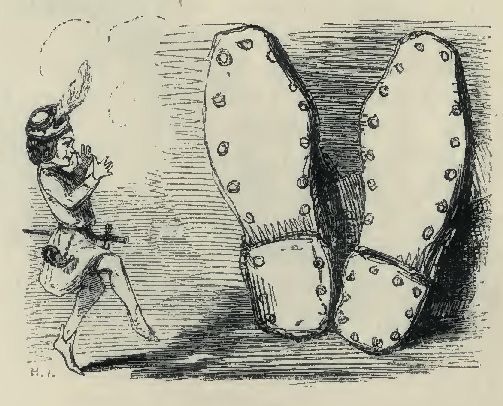
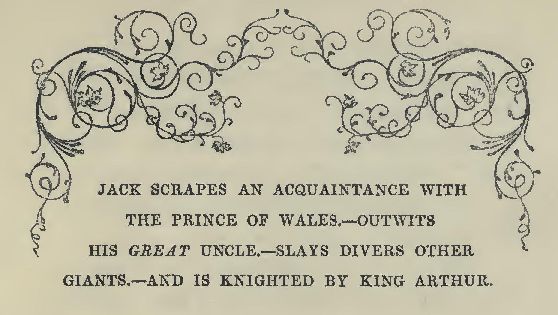
I.
Safe and sound o'er leagues of ground
Jack so merrily capers away,
Till Arthur's son (he had but one)
He runs against at the close of day.
The Prince, you know, was going to blow
A conjuror's castle about his ears,
Who bullied there a lady fair,
And I don't know how many worthy peers.
Said Jack, "My lord, my trusty sword
And self at your princely feet I lay;
'T is my desire to be your squire:"
His Royal Highness replied "You may."
The Prince was suave, and comely, and brave,
And freely scattered his money about;
"Tipped" every one he met like fun,
And so he was very soon "cleared out."
Then he turned to Jack, and cried "Good lack!
I wonder how we 're to purchase 'grub?'"
Said Jack so free, "Leave that to me,
Your Royal Highness's faithful 'sub.'"
Now night came on, and Arthur's son
Asked "Where the dickens are we to lodge?"
"Sir," answered Jack, "your brain do n't rack,
You may trust to me for a crafty 'dodge:'
A Giant high lives here hard by;
The monster I've the pleasure to know:
Three heads he's got, and would send to pot
Five hundred men!" The Prince said, "Oh!"
"My lord," Jack said, "I 'll pledge my head
To manage the matter completely right.
In the Giant's nest to-night we 'll rest,
As sure as a gun, or—blow me tight!"
Off scampers Jack, the Prince aback
With his palfrey waits beneath a rock;
At the castle-gate, at a footman's rate,
Jack hammers and raps with a stylish knock.
II.
Rat-tat-tat-tat, tat-tat,—
"Rather impudent that,"
Said Jack to himself; "but I do n't care!"
The Giant within,
Alarmed at the din,
Roared out like thunder, "I say, who's there!"
"Only me," whispered Jack. Cried the Giant, "Who's me?"
Pitching his voice in a treble key.
"Your poor cousin Jack," said the hero. "Eh!"
Said the Giant, "what news, cousin Jack, to-day?"
"Bad," answered Jack, "as bad can be."
"Pooh!" responded the Giant; "fiddle-de-dee!
I wonder what news can be bad to me!
What! an't I a Giant whose heads are three,
And can't I lick five hundred men?
Do n't talk to me of bad tidings, then!"
III.
"Alas!" Jack whimpered, "uncle dear,
The Prince of Wales is coming here,
Yourself to kill, and your castle to sack,—
Two thousand knights are at his back.
If I tell you a lie never credit me more."
The Giant replied, "What a deuce of a bore!
But I 'll hide in my cellar,
And, like a good 'feller,'
You'll lock it and bolt it, and bar it secure."
Jack answered, "I will;
Only keep yourself still."
Said the Giant, "Of that, my boy, be sure."
IV.
While the stupid old Giant, locked up with the beer,
Lies shivering and shaking in bodily fear,
Young Jack and young Arthur -
Enjoy themselves—rather,
Blowing out their two skins with the best of good cheer.
Their banquet o'er, to roost they creep,
And in the dreamy world of sleep
Eat all their supper o'er again.
Such blissful fancies haunt the brain
Of Aldermen of London Town,
When, after feed on Lord Mayor's day,
Their portly bulk supine they lay
On couch of eider-down.
V.
The morning comes; the small birds sing;
The sun shines out like—anything;
Jack speeds the son of Britain's King,
The heavier by full many a wing
And leg of pullet, on his way,
And many a slice of ham and tongue,
Whereon the heroes, bold and young,
As by good right, I should have sung,
Did breakfast on that day.
And then he seeks the Giant's cell,
Forgetting not to cram him well,
How he had plied the foe with prog,
Disarmed his wrath by dint of grog,
And, at the head of all his men,
Had sent him reeling home again.
The Giant was pleased as Punch might be,
And he capered about with clumsy glee
(It was a comical sight to see),—
Very like unto a whale
When he founders a skiff with his frolicksome tail.
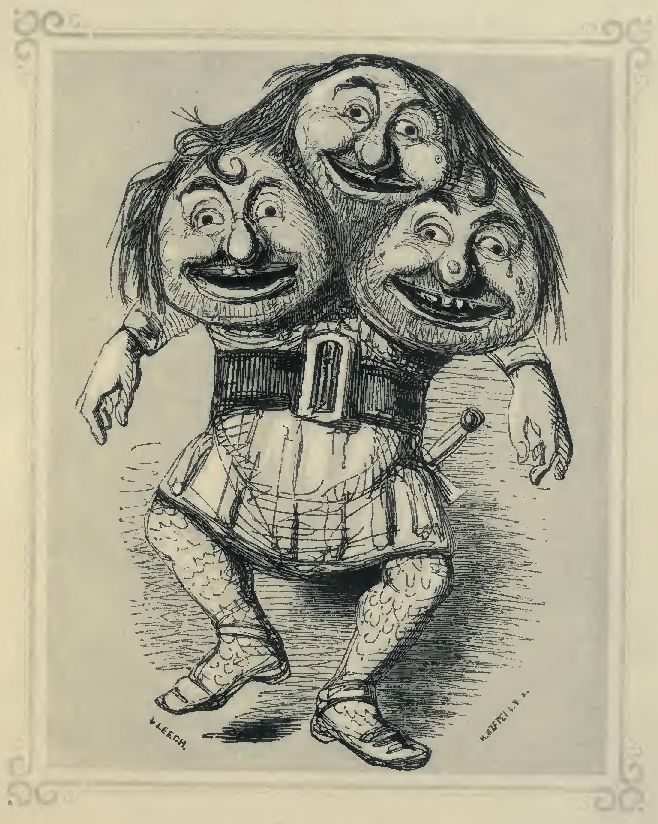
Then he cocked his big eye with a playful wink,
And roared out, "What 'll you take to drink?"
"Well," Jack replied, "I 'll tell you what,
I think I should n't mind a pot;
But, nunky,—could you be so kind?-
I wish I had those traps behind
The nest wherein you take your nap:-
That seedy coat and tattered cap;
That ancient sword, of blade right rusty;
And those old high-lows all so dusty,
That look as though for years they'd been
In pop-shop hung, or store marine;
No other meed I ask than those,
So may I have the sword and clothes? "
"Jack," said the Giant, "yes, you may,
And let them be a keepsake, pray;
They 're queer, and would n't suit a 'gent;'
But what to use is ornament?
The sword will cut through hardest stuff,
The cap will make you up to snuff,—
Worth something more than 'eight and six,'—
The shoes will carry you like 'bricks,'
At pace outspeeding swiftest stalkers-
(They were a certain Mr. Walker's);
The coat excels art's best results,
Burckhardt outvies, out-Stultzes Stultz;
No mortal man, whate'er his note,
Was ever seen in such a coat;
For when you put it on your shoulders
You vanish, straight, from all beholders!"
"Well, hang it! surely you, old chap,
Had not got on your knowing cap
When you proposed last night to hide,
Or you the magic coat had tried:
You might have strapped it on your back
So thought, but said not, cunning Jack,
Thanked his three-headed relative,
And toddled, whistling "Jack's Alive."
VI.
His cap of wit, the Giant's gift,
Informed him where the Prince to find;
And he has donned his "Walker's" swift,
And, leaving chough and crow behind,
His Royal Highness soon has joined.
"Jack," said the Prince, for fun agog,
"Get up behind, you jolly dog!"
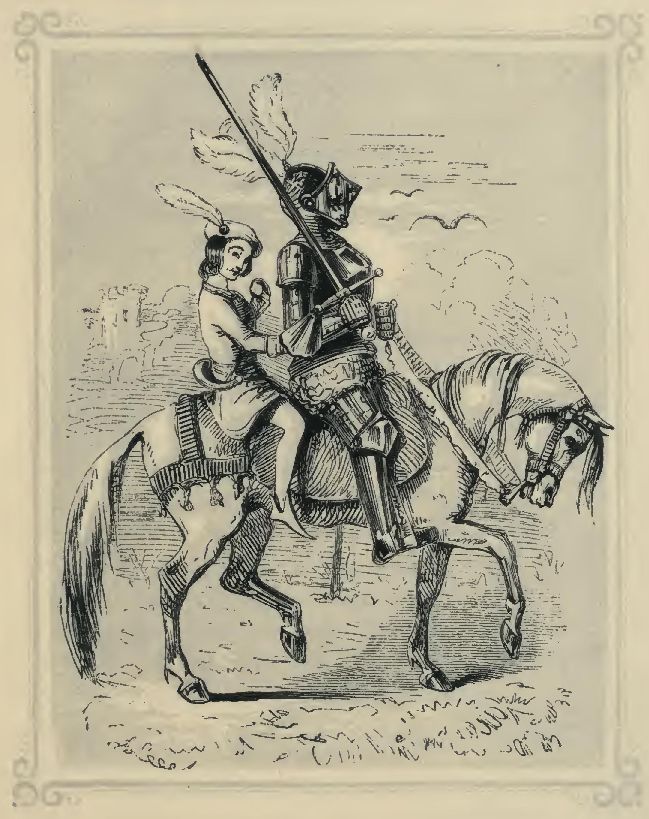
So up he jumps, and on they jog.
They soon have gained the secret bower,
Where, spell-bound by the warlock's power,
Was kept in "quod" that lady bright:
She was remarkably polite,
Displayed before them such a spread!
Oh! gracious goodness, how they fed!
No lack of turtle-soup was there,
Of flesh, and fowl, and fish,
Of choicest dainties, rich and rare;
Turbot and lobster-sauce, and hare;
And turtle, plenty, and to spare;
And sweets enough to make you stare,
And every sort of dish.
And there were floods of Malvoisie,
Champagne, and Hock, and Burgundy,
Sauterne, and Rhein-wine, and Moselle;-
It was a bouquet, sooth, to smell;
And there was Port and Sherry;—well;
And more liqueurs than I can tell.
VII.
When the banquet was ended the lady arose,
And her cherry lips wiped, and her lily white nose;
And she gazed on the gallant young Prince with a sigh,
And a smile on her cheek, and a drop in her eye.
"My lord," she addressed him, "I beg you 'll excuse
What I'm going to say, for alas! I can't choose;
You must guess who this handkerchief pockets to-night
To-morrow, or die if you don't guess aright!"
She poured out a bumper, and drank it up half,
And gave the bold Prince the remainder to quaff;
Wherewith through the "back-flat" her exit she made,
And left the young gentleman rather afraid.
VIII.
When the Prince retired to bed,
He scratched, and thus bespoke his head:-
"Where, oh! where, my upper story,
Wilt thou be to-morrow night?
Into what a mess, for glory,
Rushes bold and amorous wight!"
Jack dons, meanwhile,
His "knowing tile,"—
How ripe he looked for a regular "lark;"
He asks about,
And soon finds out,
That the lady was forced to go out in the dark
Every night,
By the pale moon light,
To give the magician, fierce and fell,
All so late,
A tête-à-tête,
In the gloomy depth of a forest dell.
In his coat and his shoes at mail-train pace,
He hies him to the trysting place.
He travels so fast that he does n't get there
Too late, as the saying is, for the fair;
But he has to wait before she comes,
Cooling his heels and biting his thumbs.
IX.
At length appears the warlock, dight
In dressing gown of gramarye;
And, like a spirit of the night,
Elegantly dressed in white,
Approaches now the fair ladye,
And gives him the handkerchief, you see;
"Now!" 'cried courageous Jack, "or never!
Die, catiff, die! "
(And he lets fly)
"Thus from its trunk thy head I sever."
X.
To be a conjuror, 'tis said,
In sooth a man requires a head;
So Jack, by this decapitation,
Dissolved, of course, the conjuration.
The damsel fair, bewitched no more,
Becomes bewitching as before;
Restored to virtue's blooming grace,
Which so improves the female face—
A kalydor of high perfection,
That beautifies the worst complexion.
XI.
The licence was bought, and, the bells ringing gay,
The prince and the lady were married next day,
All decked out so smart in their bridal array.
The happy pair, the nuptials o'er,
Start in a handsome coach-and-four
For good King Arthur's court;
Jack, on the box in easy pride,
Sits by the portly coachman's side—
Oh, my! what bows they sport.
The train behind that followed—oh!
It far outshone the Lord Mayor's show;
And e'en the grand display
When, to our Prince to give a name,
His Majesty of Prussia came
To England t' other day.
XII.
Now Arthur's seat they reach: not that
Where royal Arthur never sat—
Dun Edin's famous mound.
Loud shouts of joy the welkin crack,
And Arthur dubs our hero Jack,
Knight of the Table Round.
And now, in Pleasure's syren lap,
Sir Jack indulges in a nap-
I crave his grace—Sir John!
Flirts with the fairest dames at court,
And drinks, noblest lords, the port—
This comes of "getting on."
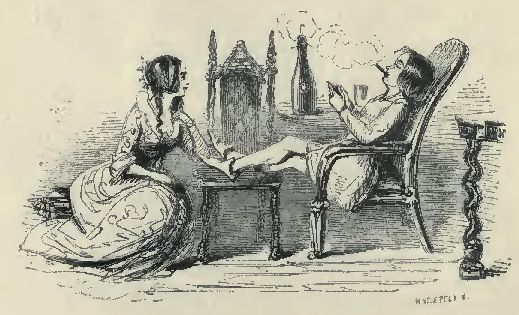
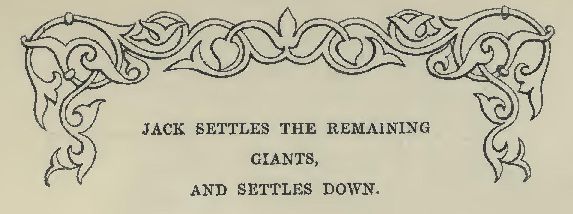
I.
"Tantara tara, tantara tara, tantara tara,—ra!
Tara tara, tara, tara, tara, tantararan ta—ta!"
II.
Hark to the warlike trumpet blast, the clarion call of fame!
Bounds not the hero's heart if he is worthy of the name?
What time the trump and kettle-drum at glorious Drury Lane,
Call bold King Dick to bide the brunt of Bosworth's battle plain;
So, to the soul of stout Sir Jack, Adventure's summon spoke,
And from her dream of luxury his martial spirit woke.
Before King Arthur's royal throne he knelt upon his knee,
And thus with courtly speech addressed his gracious Majesty:—
III.
"Illustrious Arthur, King of Trumps,
My duty bids me stir my stumps;
Fell Giants yet, your country's pest,
Your faithful liegemen much molest;
'T is my intention, if you will,
Their uncouth highnesses to kill.
I crave some loose cash and a cob,
And trust me, sire, I 'll do the job,
As sure as fate, for every snob."
"Why," said the King, "your plan's romantic
And yet't is true those rogues gigantic
Have wrought my subjects much annoy:—
Well; go and prosper, Jack, my boy;
I hope and trust you 'll put them down;
So here's a horse, and—half-a-crown.
IV.
With cap and brand,—
You understand
Well what their virtues were,-
And shoes so swift,
His uncle's gift,
Jack canters off like air:
Like air as fleet, and as viewless too,
Intent on doing "deeds of do."
"Over hill and over mountain,
Thorough forest and by fountain,"
Jack flies by day,
Gallant and gay.
Jack flies by day, though none can spy him—
Learn every one
Bored by a dun,
And take a lesson, debtors, by him—
Jack flies by night,
In the moonlight,
No "four-year-old" could have come nigh him.
At length he came to a forest vast,
Through which his journey led;
When shrieks arose upon the blast,—
"Hallo," said Jack, "who's dead? "
Like a fern owl he flits through the forest trees,
And, as he expected, a Giant he sees,
Dragging a couple along by the hair—
They were a knight and a lady fair,
And theirs was the row that rent the air.
The heart of Jack,
No way slack,
Was melted by their tears and cries;
Benevolent lad!
So he jumps off his prad,
And unto an oak the animal ties:
So Hampshire Squire, when, at the din,
Of hare entrapped in poacher's gin,
His gentle pity melts;
Dismounts him from his gallant steed,
Murmuring, "A purty joak, indeed!"
And to the rescue pelts.
V.
Jack approached the Giant nigh,
But the monster was so deucedly high,
He could n't reach to his philabeg;
But he cut him a little about the leg.
The Giant, swearing, roared, "This is
A twinge of that beastly 'rheumatis.'
I 'll take a dose of 'Blair' to-night;
If I don't, I'm ———!" Said Sir Jack, "You 're right!"
And he fetched him a blow with all his might;
The ham-strings gave, the monster fell.
Did n't he screech, and did n't he yell!
Did n't the trees around him shake!
Did n't the earth to the centre quake!
Jack lent him a kick on his loggerhead,
And trod on his brawny neck, and said-
"Oh, barbarous wretch!
I'm Jack—Jack Ketch;
I am come for thy crimes to serve thee out;
Take this, and this,
Iss! iss! iss! iss!"
And he riddled the heart of the prostrate lout—
Dear me! how the blood did spout!
VI.
The lady fair, and the gentle knight,
Scarcely could believe their sight,
When they beheld the Giant "kick;"
Unseen the hand that struck the blow,
And one cried "Ha!" the other "O—h!"
Both making sure it was old Nick.
But joy illumes their wondering mien,
When, doffing his coat of "invisible green,"
Sir Jack appears before their eyes.
"Thanks!" cried the knight, "thou valour's pink!"
"Well!" said the lady, "only think!
Oh! thank you, saviour of our life!"
"Come home, sir, with myself and wife:—
After such work," the knight pursued—
"A little ale—" "You 'll think me rude,"
Said Jack, "but know, oh worthy peer!
I thirst for glory—not for beer.
I must rout out this monster's den,
Nor can I be at ease till then."
"Don't," begged the knight, "now don't, sir, pray,
Nor run another risk to-day;
Yon mount o'erhangs the monster's lair,
And his big brother waits him there,
A brute more savage than himself;
Then lay your courage on the shelf."
"No!" Sir Jack answered, "if I do,
May I be hanged! Now, mark me, you!
Were there twice ten in yonder hole,
Ere sinks behind yon crag the sun,
The gory head of every one
Before my feet should roll!
Farewell—I 'll call as I come back."
"Adieu," the knight replied; "Alack!
I had forgotten; here's my card."
"Thank you," said Jack, and "bolted hard."
VII.
Away, away, to the mountain cave,
Rides Jack at a spanking trot;
No Knight of the Poll-axe, all so brave,
Could have distanced him I wot!
The Gorgon's head you ne'er have seen—
Nor would it much avail,
To marble ears, Ï rather ween,
The bard to sing his tale.
But oft the Saracen's, I know,
Hath horrified your sight
On London's famous Hill of Snow,
Which is n't often white.
Such was the visage, but four times its size,
With a trunk to match, that our champion spies.
By the mouth of the cave on a chopping-block sitting,
Grinding his teeth and his shaggy brows knitting,
Was the Giant;—and rolling his terrible eyes
Like portentous meteors, they
Glimmered, glowed, and flashed away;
His cheeks and nose were fiery too;
Like wire on his chin the bristles grew;
And his tangled locks hung down his back,
Like the legs of a Brobdignag spider so black;
Ready, the thickest skull to crack
That ever county member wore,
His iron club beside him lay.
He was in a terrible way,
For he voted his brother's not coming a bore.
VIII.
The hero, Jack, dismounts to dress—
What was his toilet you may guess;
So may I be ever dight
When I bow me for the fight.
IX.
Like a cliff o'er ocean lowering,
Or some old and cross curmudgeon
Waiting, dinnerless, in dudgeon,
Sits the Giant glumly glowering.
Hears he not a whisper say,
"So there you are, old rascal, eh? "
Hears he not a step approaching,
Though he may n't the comer see?
No; like rogue by streamlet poaching,
Creeps Jack near him stealthily.
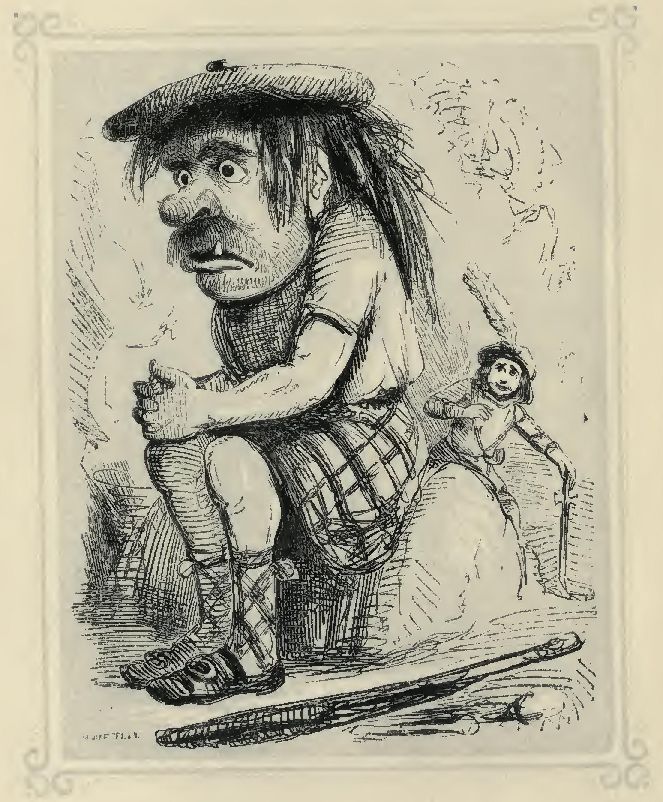
X.
As when some school-boy—idle thief—
With double-knotted handkerchief,
What time his comrade stooping low,
With tightened skin invites the blow;
With sundry feints, delays to smite,
And baulks, to linger out delight;
So Jack, with thorough-going blade,
Stood aiming at the Giant's head.
At last the champion cried, "Here goes
Struck, and cut off the monster's—nose.
Like a thousand bulls all roaring mad,
Was the furious Giant's shout,
With the iron club, which I said he had,
Oh! how he laid about!
"Oho! if that's your way, old cock,
We must finish the game," quoth Jack;
So he vaulted upon the chopping-block,
And ran him through the back.
The Giant howled; the rocks around
Thrilled with his demon squall,
Then flat he fell upon the ground,
As the Monument might fall.
XI.
The Giants slain, the Cornish man
Despatched their gory heads by van
To great King Arthur;—gifts more queer
Have ne'er been sent to our Sovereign dear.
She gets gigantic cheeses, cakes,
Which loyal-hearted subject makes;
Gigantic peaches, melons, pumpkins,
Presented by her faithful bumpkins;
And giant heads of brocoli—not
The heads of Giants sent to pot—
Long may such heads, and such alone,
Be laid before her stainless throne!
XII.
Now Jack the darksome den explores,
And through its turns and windings pores,
'Till to a spacious hall he comes,
Where, o'er the hearth, a cauldron hums,
Much like a knacker's in the slums;
Hard by, a squalid table stood,
All foul with fat, and brains, and blood;
The two great Ogres' carrion food.
Through iron grate, the board beside,
Pale captive wretches he descried;
Who, when they saw the hero, cried,
"Alas! here comes another, booked,
Like us, poor pris'ners, to be cooked."
"Thank you," said Jack; "the Giants twain
Have had their bellyful of me;
To prove I do not boast in vain,
Behold, my bucks of brass, you 're free!"
And he brast the bars right speedily.
To meat they went, and, supper done,
To the treasury they hied each one
And filled their pockets full of money.
What Giants could want with silver and gold,
In sooth tradition hath not told:—
'T is a question rather funny.
XIII.
The very next day
The rest went away,
To their dear little wives and their daughters,
But Jack to the knight's
Repairs with delights
To recruit himself after his slaughters.
The lady fair and the gentle knight
Were glad to see Sir Jack "all right;"
Resolved to "do the handsome thing,"
They decked his finger with a ring
Of gold that with the diamond shone—
This motto was engraved thereon:—
See Page Image==>
XIV.
The feast is spread in the knightly hall,
And the guests are uproarious, one and all,
Drinking success to the hero stout
Who larruped the Giants out-and-out;
When, lo! all their mirth was changed to gloom,
For a herald, all whey-faced, rushed into the room.
Oh, the horrified wight!
What a terrible sight!
He spoke—five hundred jaws were still;
Eyes, twice five hundred, staring wide—
"Mac Thundel's coming, bent to kill
You, valiant champion—hide, sir, hide!"
The cry of the crowd without they hear,
"Mac Thundel is coming, oh dear! oh dear!"
"And who the deuce is this Mac Thundel,
That I," Sir Jack replied, "should bundle?"
"Mac Thundel, Sir Knight, is a two-headed beggar,
You have slain his two kinsmen, the Giants Mac Gregor:
That he 'll kill you and eat you he swears, or 'de'il tak' him,'"
"Ha, ha, ha!" laughed bold Jack, "let him come—I shall whack him."
"Gentles and ladies, pray walk below
To the castle yard with me;
You don't object to sport I know,
And rare sport you shall see."
"Success to gallant Jack!" they shout,
And follow, straight, the champion stout.
The knight's retainers he summons, all hands,
And thus with hasty speech commands:-
"Ho! merrymen, all, to the castle moat,
Cut the drawbridge well nigh through;
While I put on this elegant coat
The knaves his bidding do.
The form of the hero dissolves in air,
And the ladies exclaim and the gentlemen stare.
XV.
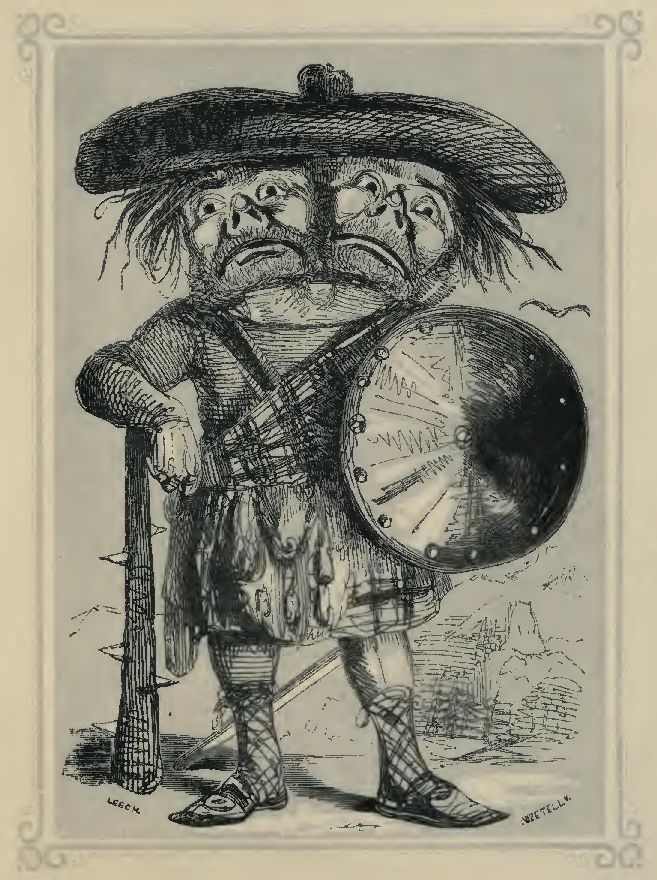
Stumping, thumping, blundering, lo!
Comes the Giant Scot in sight;
All the people screaming "Oh!"
Fly before him in affright.
Look, he snorts and sniffs, as though
His nose had ken'd an unseen foe;
And hearken what he thunders forth,
In gutteral accent of the north!
See Page Image==>
XVI.
"Indeed!" replied the Giant Killer;
"Old fellow, you 're a monstrous miller!"
Disclosing his form to Mac Thundel's sight,
Who foamed at the mouth with fury outright.
"Are ye the traitor loon," he cried,
"By wham my twa bauld brithers died?
Then 'a will tear thee wi' my fangs,
And quaff thy bluid to quit thy wrangs!"
"You must catch me first, old stupid ass!"
Said Jack—he quoted Mrs. Glass;
And he scampers away in his nimble shoes:
Like a walking Ben Lomond, Mac Thundel pursues.
In and out,
Round about,
Jack dodges the Giant apace,
Round the castle wall,
That the guests may all
Enjoy the stirring chase.
O'er the drawbridge he courses, mid shouts of laughter
Mac Thundel heavily flounders after,
Whirling his mace around his head:—
The drawbridge groans beneath his tread—
It creaks—it crashes—he tumbles in,
Very nearly up to his chin,
Amid the assembled company's jeers,
Who hail his fall with "ironical cheers."
He roars, rolls, splashes, and behaves
Much like some monster of the waves,
When "sleeping on the Norway foam,"
The barbéd harpoon strikes him home.
By the side of the moat Jack, standing safe,
Begins the Giant thus to chafe;—
"Just now, old chap, I thought you said
You'd grind my bones to make your bread."
Mac Thundel plunged from side to side,
But he could n't get out although he tried;
Sooth to say, he was thoroughly done—
"Now," said Jack, "we 'll end the fun.
Yon cart rope bring,
Ay—that's the thing!"
And he cast it o'er the heads so big;
A team was at hand,
And he drew him to land,
While all the spectators cried, "That's the rig!"
His falchion gleams aloft in air,
It falls; the monster's heads, I ween,
Are off as quick as Frenchmen's e'er
Were severed by the guillotine.
With shouts of joy the castle rang,
And they hied them again to the festal cheer
Long life to brave Sir Jack they sang,
And they drank his health in floods of beer.
XVII.
Awhile the hero now reposes,
In knightly hall an honoured guest;
His brow by beauty crowned with roses,
And filled his belly with the best.
But soon the life of idlesse palls,
For daring deeds his heart is "game;"
"Farewell," he cries, "ye lordly walls!"
And starts anew in quest of fame.
Over hill and dale he wends;
Fate no fresh adventure sends
To reward him for his pains,
Till a mountain's foot he gains.
Underneath that hill prodigious
Dwelt an anchorite religious:
He batter'd the door with divers knocks;
He didn't make a little din;
And the hermit old, with his hoary locks,
Came forth at the summons to let him in
"Reverend sire," cried Jack, "I say,
Can you lodge a chap who has lost his way?
The grey-beard eremite answered "Yea—
That is if thou cans't take 'pot luck.'"
"I rather think I can, old buck!"
The hero answer made, and went
To supper with no small content.
XX.
When Jack had eaten all he could,
Bespoke him thus the hermit good,-
"My son, I think I 'twig' the man
Who 'slew the Giant Cormoran.'
On yonder hill-top a regular bad 'un
Dwells in a castle just like Haddon
(Haddon!—thou know'st its time-worn towers,
Drawn by ascertain friend of 'ours');
That Giant's name is Catawampus;
And much I fear he soon will swamp us,
Unless that arm—" Cried Jack "Enow;
He dies!" The hermit said, "Allow
Me to remark—you wo n't be daunted—
But know his castle is enchanted;
Him aids a sorcerer of might
Slockdollagos the villain's hight;
They crossed the main from western climes;
And here, confederate in crimes
(They term them 'notion's'), play their tricks;
Bold knights (to use their slang) they 'fix,'
Transforming them, at treacherous feasts,
With stuff called 'julep,' into beasts.
They served a duke's fair daughter so,
Whom they transmuted to a doe;
Hither they brought the maid forlorn,
On car by fiery dragons borne;
To free her, champions not a few
Have tried, but found it would n't do;
Two griffins, breathing sulph'rous fire,
Destroy all those who venture nigh her;
But thee thy coat will keep secure."
Jack answered gaily, "To be sure; "
And swore that when the morning came,
He 'd lose his life or free the dame.
XXI.
Now Night o'er earth her pall had spread,
And dauntless Jack repaired to bed.
O'er the hero as he slumbers,
Spirits hymn aerial numbers;
In a chorus manifold,
Of the deeds and days of old;
Fairy dreams his rest beguile,
Till he feels Aurora's smile.
XXII.
"Hallo!" cries Jack, as he awakes,
Just as the early morning breaks,
And rubs his eyes,—
"'Tis time to-rise."
And ready for mischief he gaily makes.
XXIII.
With the mist of the morning, a little bit
More transparent, I trow, than it,
He climbs the mountain's craggy side;
Anon the castle's lordly pride
He braves with free and fearless brow,
And mutters, "Now then for the row! "
Before the gates on either side,
A "formidable shape" he spied;
A monstrous griffin right and left,
Like to an antediluvian eft;
Green of back and yellow of maw,
Forked of tongue, and crooked of claw;
Belching and snivelling flame and fire,—
A regular pair of chimeras dire.
"Oh!" said Jack, and he made a face,
"I never saw such a scaly brace!"
Unharmed he 'scaped, because unseen,
Those monsters all so fierce and green;
Through files of reptile guards he passed,
Scolopendras black and vast;
Many a hydra, many a lizard,
Heros' tomb its filthy gizzard;
Dragon with mouth like Ætna's crater,
Crocodile and alligator;
Huge spiders and scorpions round him crawled,
Monstrous toads before him sprawled;
Great rattle-snakes their fangs displayed—
"Hurrah!" he shouted, "who's afraid?"
And now upon the inner gate
He reads these mystic words of fate:—
See Page Image==>
XXIV.
Above the distich hung the trump:-
The hero got it with a jump,
And shouting gallantly, "Ya—hips!"
Applied the mouth-piece to his lips.
A blast he blew,-
Asunder flew
The portals with a brazen clang:
Windows were smashed,
And chains were clashed,
While a thousand gongs in discord rang.
A voice within, that seemed the note
Of some prodigious magpie's throat,
In ranc'rous tone cried, "Hallo, now!
I say, what means this tarnel row?"
And out came Catawampus, cross;
Behind him slunk Slockdollagos;
The Great Sea Serpent, trailing slim
His coils tremendous, after him.
XXV.
Six of the tallest men that e'er
Raised in old Kentucky were,
Each standing on the other's head,
Had scarce o'ertopped the monster dread;
The brim of his hat, so considerate,
Was half as big round as the King's Round Table;
His massive club was a maple's trunk:-
He might have made great Arthur "funk."
Arthur the First, or Arthur the Second,
As Arthur oe Wellington may be reckoned.
Slockdollagos was rather less,
But he was n't very short, I guess:—
He was fashionably drest,
In the style of a Wizard of the West.
XXVI.
"Clear off, now," was the Giant's cry;
"The oldest man in all Kentucky
My father whopp'd—my father, I:—
Absquotilate, and cut your lucky!"
Catawampus looked on every side,
But not a single soul espied;
To the right and left he grimly grinned,
Till the trunks of the very trees were skinned.
"Come out!" he bawled, "or I swear I 'll dash
Your brains into an immortal smash!
Don't raise my dander; if you do,
You won't much like me,—I tell you."
XXVII.
Jack laughed this bootless brag to hear,
And thus he sang in the Giant's ear:-
"Yankee doodle doodle doo,
Yankee doodle dandy;
Prepare your knavish deeds to rue,
For know, your fate is handy!"
XXVIII.
Slockdollagos turned green and blue,
But Catawampus in fury flew,
And brandished at random his maple stick,
Smashing the nose of the wizard "slick
Who fetched him in return a kick,
Crying, "Hallo! I wish you'd mind;
I rather speculate you 're blind."
XXIX.
Catawampus bellowed "Oh!
I say, tarnation sieze your toe!"
Rubbing the part as he limped and hopped:
Jack his legs in sunder chopped.
He fell with an astounding sound,
And his castle tottered to the ground.
In faith, the most "tremendous fall
In tea," to this, was nothing at all.
No wallop'd nigger, to compare
Small things, for the nonce, with great,
Ever so dismally the air
Rent with shrieks, I estimate.
The monstrous Yankee thus laid low,
Jack settled his hash with another blow;
So he gave up the ghost, and his dying groan
Had a "touch of the earthquake" in its tone.
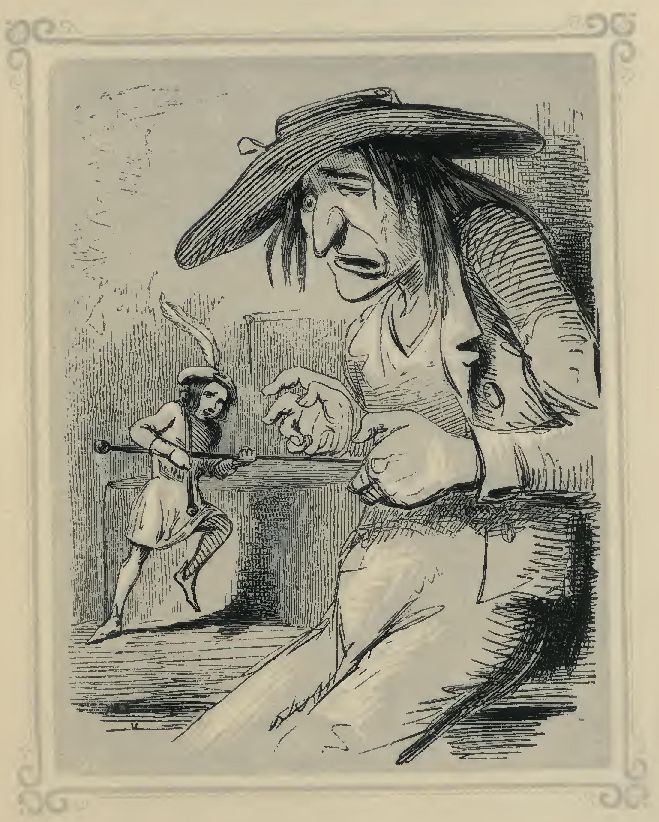
XXX.
Biting his nails, and shaking with fear,
The wizard vile was standing near;
When he saw Catawampus fall and die,
He knew that the end of his course was nigh.
"My flint," he cried, "is fixed, I snore!"
He rent his hair and his garments tore,
Blasphemed and cursed, and vowed and swore.
Jack felt half frightened and greatly shocked,
When, behold! the mountain rocked:
Sudden night overspread the sky;
Pale blue lightnings glimmered by;
Roared the thunder, yawned the earth;
And with yells of hideous mirth,
Mid serpents and skeletons ghastly and dire,
The spirits of evil came in fire;-
Beelzebub and Zatanai,
Asdramelech and Asmodai,
Zamiel and Ashtaroth, with legions
Of frightful shapes from Pluto's regions;
And, the sorceror shrieking with frantic dismay,
On the wings of a whilwind they bore him away.
When once again the daylight broke,
The castle had vanished away like smoke.
XXXI.
"My eye!" said Jack, a little serious;
"Upon my word, that was mysterious!"
But cheers and joyous gratulations
Cut short the hero's meditations;
The "deformed transformed" round him press,
Knights and ladies numberless;
Who each, as Jack, you know, had heard,
The warlock had changed to beast and bird;
And who straight had recovered their pristine condition
When Old Nick flew away with the wicked magician.
XXXII.
Hurrah! Jack's labours now are done,
He hath slain the Giants all, save one;
I mean his great uncle; and he's bound o'er
To keep the peace for evermore.
XXXIII.
To ancient Yenta's city fair
Forthwith the champion makes resort;
For Arthur kept his castle there
(Still, in the Nisi Prius Court,
The Table Round of his famous hall
Gaily flaunts upon the wall).
Through the King's gate he took his way
(He had come by sea to Hampton town,
Where he called, just "How d' ye do?" to say,
On Bevis, knight of high renown).
As he passed through the Close, all the friars, to see him,
Came out in canonicals, singing "Te Deum;"
As he rode up the High Street, the little boys followed,
And they flung up their caps, cheered, and shouted, and halloed.
The windows were crowded with ladies so bright,
All smiling and waving their kerchiefs of white.
Jack with dignity bowed
Right and left to the crowd,
Gracefully mingling the humble and proud.
XXXIV.
He now before King Arthur's throne,
Knelt with obeisance grave;
A thousand bright eyes on him shone,
As they shine upon the brave.
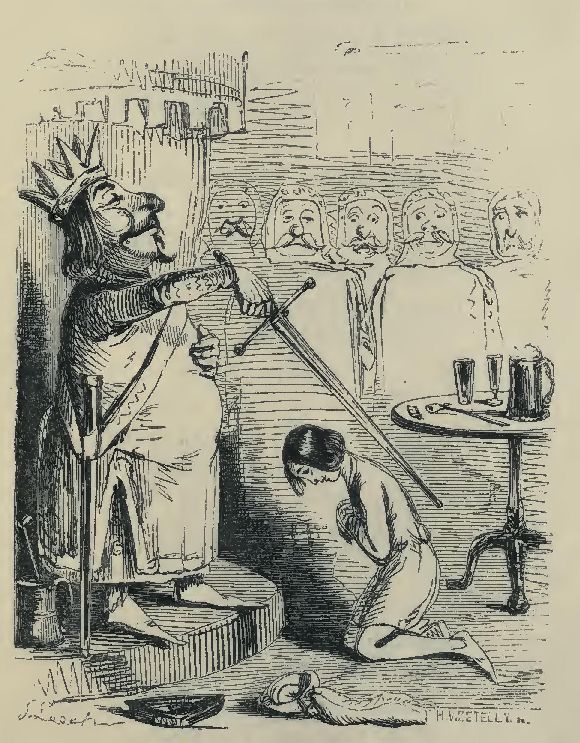
"Rise up," the noble Arthur said,
"Sir Jack, a Baron bold;"
And he placed upon the champion's head
A coronet of gold.
"This Princess fair shall be thy bride,
Our cousin, by my fay;
And let the nuptial knot be tied
This morn without delay."
XXXV.
The holy wedding mass was sung,
And the cathedral's bells were rung;
A banquet was made in the royal hall,
And after that there was a ball.
There waltzed Sir Lancelot du Lac,
And eke Sir Tristram bold;
Likewise the stout Sir Caradoc,
"That won the cup of gold."
But none among King Arthur's court,
For style, and grace, and air,
And noble mien, and knightly port,
Could with Sir Jack compare.
XXXVI.
Together with a beauteous mate
The King gave Jack a great estate:
In bliss the hero, with his wife,
Lived the remainder of his life.
"In story shall he live for aye
Such is the say of Merlin, sage;
And by Saint George! fair England's stay,
His name, till time shall pass away,
Shall never fade from glory's page.
For all your march of intellect,
Your pumps so prim, and blues so clever,
The useful-knowledge-mongering sect,—
Jack, famous Jack, shall live for ever!
